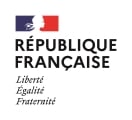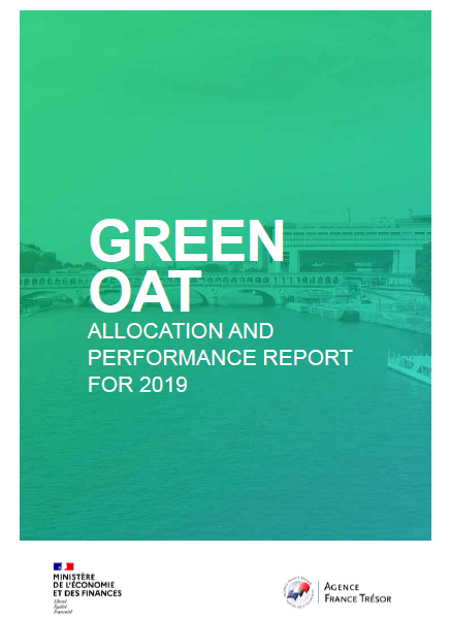Presentation
In 2017, France became the first sovereign borrower to issue a benchmark green bond, the OAT 1.75% 25 June 2039. It stepped up its commitment to sustainable finance by issuing a second green bond in 2021, the OAT 0.5% 25 June 2044. In 2022, AFT made a further contribution to sustainable finance with the first sovereign green inflation-indexed bond (here, inflation in the euro area), the OAT€i 0.10% 25 July 2038. It was issued by syndication for an initial outstanding amount of €4bn on 25 May 2022, followed up by a tap issue auction in September, increasing its outstanding par value to €4.5bn at the end of 2022. Eligible green expenditures matched to this new bond in 2022 account for a higher amount, namely €4.9bn, because the index-linking supplements received on these issues is also allocated to the financing of green expenditures. An appendix to the green OAT framework document published on the occasion of this innovation clarified the scope of funds matched to eligible green expenditure, in relation to public accounting categories.
The green OAT 2044 was also reissued in 2022, in February and July. Its outstanding increased by €5.1bn over one year, rising to €16.5bn by the end of 2022. France issued green bonds for a total of €9.6bn in 2022, taking the outstanding total to €52.0bn at the end of the year. France has thus confirmed its position as a leading global issuer on this market. This reflects its leading role in meeting the ambitions of the Paris Climate Agreement of December 2015.
Each year, the funds raised by Green OAT issues are used to finance a set of green projects under the State budget to mitigate climate change and anticipate the associated risks, preserve biodiversity and fight pollution. Each year, the various ministries identify the expenditures in their budgets that match these objectives. These expenditures are submitted to the Green OAT Evaluation Council for its opinion, and then they are submitted for validation by an interministerial steering committee working under the aegis of the Prime Minister. The Greenfin certification created by the Ministry for Ecological Transition to attest to the green credentials of investment funds is used as a benchmark in this selection process.
For accounting purposes, raised funds are treated in the same way as funds from a conventional OAT and managed in compliance with the general budget rule. The allocation and performance reports, drawn up every year on th basis of the Budget Review Bill, are used to verify the nominal equivalence between this source of funds and the uses matched to it. In August 2022, the fifth allocation and performance reports was published, presenting the expenditures matching the 2021 green debt issues. According to the same timetable, the report on the funds raised in 2022 will be published in the summer of 2023. Furthermore, in July 2022 the fifth environmental evaluation report on eligible expenditures for Green OATs was published, focusing on satellite observation of the Earth and on weather forecasts. The Council's work is now focused on the financing of renewable energies. These evaluations contribute to effective steering of public policy and constitute one of the contributions of green OATs.
September 2023 - Update of the second party opinion on the French Republic's Green OAT by Moody's ESG Solutions (Elegible Green Expenditures 2022 ex post)
August 2022 - Update of the second party opinion on the French Republic's Green OAT by Moody's ESG Solutions (Elegible Green Expenditures 2021 ex post)
May 2022 - Update of the second party opinion on the French Republic's Green OAT by Moody's ESG Solutions(Elegible Green Expenditures 2022 ex ante)
July 2021 - Update of the second party opinion on the French Republic's Green OAT by the independant agency V.E (Elegible Green Expenditures 2021 ex ante)
March 2021 - Update of the second party opinion on the sustainability of the French Republic’s Green OAT (Elegible Green Expenditures 2020 ex post)
January 2017 - Second party opinion on the sustainability of the French Republic’s Green OAT
AFT has regularly taped the Green OAT since the initial issuance to maintain its liquidity, as it does for conventional benchmark OATs. Consequently, the outstanding amount of the Green OAT has been increased by successive tap issues. The proceeds from tap issues are also matched to Green Eligible Expenditures, as the cumulative amount of such expenditure has rised over the years (see Green OAT fact sheet).
France provides several types of report to investors: an annual report on allocation and performance indicators and a report on ex post impacts at an appropriate frequency. The ex-post impact reporting is reviewed by an independent Council.
The Green OATs Evaluation Council
The Green OATs Evaluation Council is chaired by Manuel Pulgar-Vidal and its members are eight independent experts:
- Mats Andersson, Vice-Chairman of the Global Challenges Foundation, Chairman of PDC and former CEO of AP4, Sweden’s fourth national pension fund;
- Nathalie Girouard, Head of the Environmental Performance and Information Division of the Environment Directorate at the OECD;
- Mike Holland, independant consultant ;
- Karin Kemper, Senior Director for the Environment and Natural Resources Global Practice at the World Bank;
- Rana Roy, independant consultant ;
- Thomas Sterner, Professor of Environmental Economics at the University of Gothenburg;
Two observers also take part in the Council:
- Sean Kidney, co-founder and CEO of the Climate Bond Initiative;
- Nicolas Pfaff, Senior Director and Secretary to the Green Bond Principles, ICMA (International Capital Market Association).
The Green OATs Evaluation Council defines the specifications and schedule for evaluation reports on the environmental impact of Green Eligible Expenditures financed by France’s green sovereign bond. The Council also gives its opinion on the quality of the evaluation reports and the impact and relevance of the findings. All of its work is published on the Agence France Trésor website. The Secretariat of the Green OATs Evaluation Council is provided jointly by the General Commission for Sustainable Development and the Directorate General of the Treasury.
21 December 2023 : Download the Council’s opinion on the impact assessment report on renewable energy subsidies
21 December 2023 : Download the full impact assessment report on renewable energy subsidies
21 December 2023 : Download the terms of reference for the impact assessment report on renewable energy subsidies
26 November 2021: Download the Council’s opinion on the Impact Assessment Report on the innovation strategy of the Investments for the Future Programme (PIA)
26 November 2021: Download the full Impact Assessment Report on the innovation strategy of the Investments for the Future Programme (PIA)
26 November 2021: Download an overview of the Impact Assessment Report on the innovation strategy of the Investments for the Future Programme (PIA)
26 November 2021: Download the terms of reference for the Impact Assessment Report on the innovation strategy of the Investments for the Future Programme (PIA)
27 November 2020: Download the Council’s opinion on the Impact Assessment Report on the Subsidy to the French forest national office
27 November 2020: Download the full Impact Assessment Report on the Subsidy to the French forest national office
27 November 2020: Download an overview of the Impact Assessment Report on the Subsidy to the French forest national office
27 November 2020: Download the terms of reference for the Impact Assessment Report on the Subsidy to the French forest national office
29 November 2018: Green OAT: first impact report on the energy transition tax credit issued
06 September 2018 : Agence France Trésor rewarded again by Euromoney/Global Capital
26 June 2018 : Results: Syndicated tap issue of the Green OAT 1.75% 25 June 2039
25 June 2018 : Announcement: Syndicated tap issue of the Green OAT 1.75% 25 June 2039
20 June 2018 : Release of 2017 Green OAT allocation and output report
21 March 2018 : France's Green OAT wins award from Climate Bonds Initiative
24 January 2018: Green OAT: Announcement of the amount of Green Eligible Expenditures for 2018
Learn more about the green OAT
(video only available in French)









